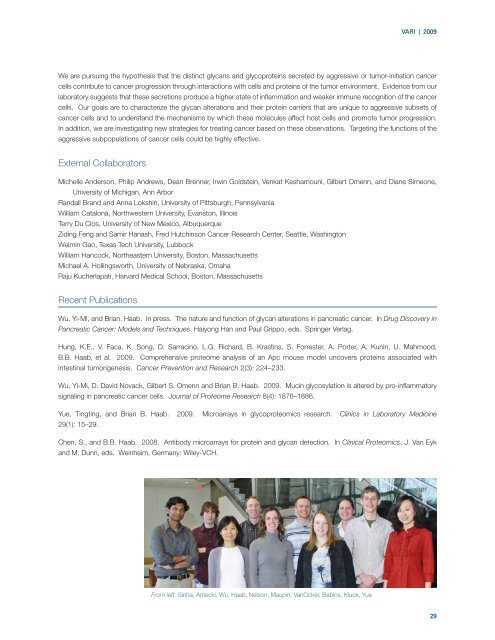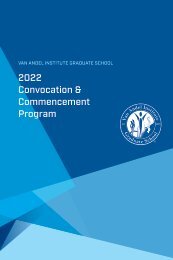2009 Scientific Report
Create successful ePaper yourself
Turn your PDF publications into a flip-book with our unique Google optimized e-Paper software.
VARI | <strong>2009</strong><br />
We are pursuing the hypothesis that the distinct glycans and glycoproteins secreted by aggressive or tumor-initiation cancer<br />
cells contribute to cancer progression through interactions with cells and proteins of the tumor environment. Evidence from our<br />
laboratory suggests that these secretions produce a higher state of inflammation and weaker immune recognition of the cancer<br />
cells. Our goals are to characterize the glycan alterations and their protein carriers that are unique to aggressive subsets of<br />
cancer cells and to understand the mechanisms by which these molecules affect host cells and promote tumor progression.<br />
In addition, we are investigating new strategies for treating cancer based on these observations. Targeting the functions of the<br />
aggressive subpopulations of cancer cells could be highly effective.<br />
External Collaborators<br />
Michelle Anderson, Philip Andrews, Dean Brenner, Irwin Goldstein, Venkat Keshamouni, Gilbert Omenn, and Diane Simeone,<br />
University of Michigan, Ann Arbor<br />
Randall Brand and Anna Lokshin, University of Pittsburgh, Pennsylvania<br />
William Catalona, Northwestern University, Evanston, Illinois<br />
Terry Du Clos, University of New Mexico, Albuquerque<br />
Ziding Feng and Samir Hanash, Fred Hutchinson Cancer Research Center, Seattle, Washington<br />
Weimin Gao, Texas Tech University, Lubbock<br />
William Hancock, Northeastern University, Boston, Massachusetts<br />
Michael A. Hollingsworth, University of Nebraska, Omaha<br />
Raju Kucherlapati, Harvard Medical School, Boston, Massachusetts<br />
Recent Publications<br />
Wu, Yi-Mi, and Brian. Haab. In press. The nature and function of glycan alterations in pancreatic cancer. In Drug Discovery in<br />
Pancreatic Cancer: Models and Techniques, Haiyong Han and Paul Grippo, eds. Springer Verlag.<br />
Hung, K.E., V. Faca, K. Song, D. Sarracino, L.G. Richard, B. Krastins, S. Forrester, A. Porter, A. Kunin, U. Mahmood,<br />
B.B. Haab, et al. <strong>2009</strong>. Comprehensive proteome analysis of an Apc mouse model uncovers proteins associated with<br />
intestinal tumorigenesis. Cancer Prevention and Research 2(3): 224–233.<br />
Wu, Yi-Mi, D. David Novack, Gilbert S. Omenn and Brian B. Haab. <strong>2009</strong>. Mucin glycosylation is altered by pro-inflammatory<br />
signaling in pancreatic cancer cells. Journal of Proteome Research 8(4): 1876–1886.<br />
Yue, Tingting, and Brian B. Haab. <strong>2009</strong>. Microarrays in glycoproteomics research. Clinics in Laboratory Medicine<br />
29(1): 15–29.<br />
Chen, S., and B.B. Haab. 2008. Antibody microarrays for protein and glycan detection. In Clinical Proteomics, J. Van Eyk<br />
and M. Dunn, eds. Weinheim, Germany: Wiley-VCH.<br />
From left: Sinha, Antecki, Wu, Haab, Nelson, Maupin, VanOcker, Babins, Kluck, Yue<br />
29
















